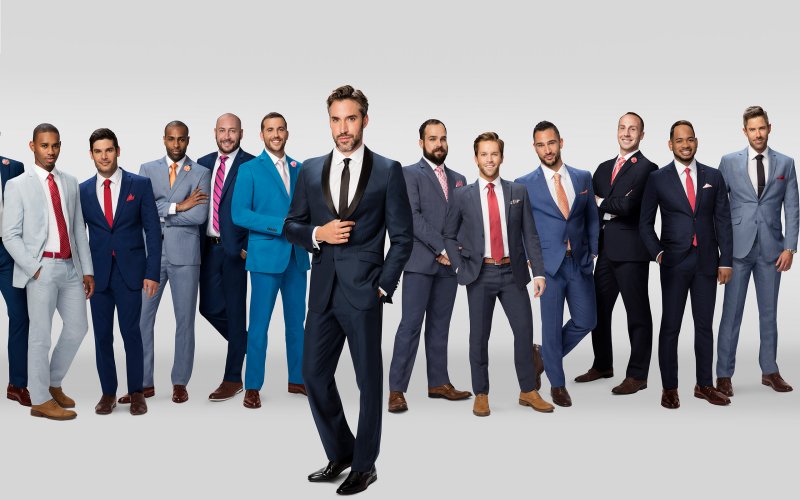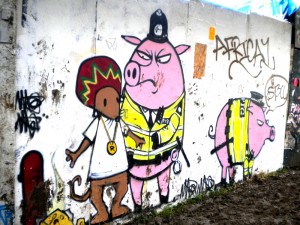
Excavating the Nightmare: Finding Prince Charming
by Vincent Chabany-Douarre | February 11, 2017
It was one of the most anticipated reality shows of the decade: A gay Bachelor.
The original Bachelor‘s channel, ABC, has long been known for its wholesome family fun (read, white heteronormative fun), and The Bachelor is no exception. The women must remain virginal. The men, good providers. Widows and widowers advance faster in the competition because they are ‘vulnerable’, but are ultimately dropped: damaged goods don’t win. Black people get cut around episode four, leaving us with a lily-white cast. If you are, like most recent bachelorette Jojo Fletcher, half-Persian, your ethnicity must not be part of your brand.
So a gay Bachelor seemed, for what is was worth, revolutionary to lovers of reality television such as myself. Not only that, but being gay, very few reality or dating shows have gay contestants, so I was that much more excited. Of course, it came with a set of logistical problems, the main one being whether the candidates would actually hook up. But even in their most simple form, these shows rely heavily on suspension of disbelief, so the audience decided to trust Logo. Which is not any channel either: it launched RuPaul’s Drag Race, a staple of gay culture, which has addressed and given a platform to many problems faced by the LGBT community. Were these issues played up for tears and views? Yes. Would silence be better? Probably not.
And so I came in with high hopes.
Then the show premiered.
Finding Prince Charming is, to put it bluntly, an absolute waste of its own concept. First things first, the show is tragically low-rent: filmed in the same house as Bad Girl’s Club, the allegedly romantic dates seem to have been thrown together last minute. They pale in comparison to its straight counterpart, where helicopters fly to the Statue of Liberty, and then back to a romantic dinner in a Manhattan penthouse. In Prince Charming, the men are tasked with decorating the house with fabric rolls for a masquerade ball.
We can all enjoy a low-budget television show. They’re less produced, more unfiltered, delve into unexpected territory. Remember the cheapness of the first season of Drag Race? Or America’s Next Top Model? And yet. Prince Charming does not own its lack of production value: they try and project a form of polish they simply cannot afford, and end up looking like a fifth-grade play in a Montana public school.
All of this could’ve been forgiven if the cast had been better. And although it’d be hard to waste time on the contestants since I remember none of them, dating shows hinge on the object of the affection: ‘the Bachelor’. Or in this case, ‘the Prince Charming’. You need crazy contestants, villains, sweethearts, but more than anything, you need to at least vaguely believe that the bachelor is worth all this mess. And boy, did Logo fail. Robert Sepulveda Jr. is, as pointed out by Casey Wilson, the least attractive attractive person you will ever meet. With his robot-like enunciation and absent personality, Robert feels like the bland romantic interest in any Lifetime Christmas rom-com, if you added American Psycho to the mix.
For the purposes of this article, I tried to imagine waking up and having married Robert. I would probably exist in a haze of borrowed mansions on Venice beach, painkillers and cashmere sweaters, floating aimlessly from art gallery to art gallery. I think about sneaking cigarettes behind one of Le Cirque’s dumpsters (I do not think Robert would approve of my smoking) and extinguishing it on my arm just so I would feel something. And I would not, because of the pills.
Speaking of abs, looking at the contestant line-up, and you’ll get one immediate conclusion: Robert (Prince Charming) is so ripped I feel comfortable suggesting that he might’ve gotten liposuction on his abs. And the contestants are hardly different. Everybody’s muscular to an uncomfortable point. Contestant Daniel confessed he didn’t actually like working out, but just wanted to look good. He was eliminated that very episode. Every ab must be apparent, not an inch of fat must be seen, and Robert’s lips have not touched carbs since the day of my birth.
What’s been most criticised by others, however, is not Finding Prince Charming’s boring and over-ripped contestants, terrible production value, lack of imagination or very questionable ‘Prince Charming’. That just made the show mediocre, and that has never stopped anyone from watching television, just ask any American Horror Story fan. What’s been most criticised are the show’s politics.
The very concept of the show has been violently attacked, especially in the way it represents gay men. It is always tough to portray, create or represent sub-groups. For LGBTs, the questions are always the same. Are we playing into dominant cultural codes if we form nuclear families? Or are we being stereotypical by having the show be wilder? Are the most flamboyant men simply hiding their vacuity behind bad hair and terrible clothes? Or are the more masc. ones brainwashed into constantly dropping their voice five-octaves? Are the Drag Race contestants simply consumed for entertainment like zoo animals, or are they reclaiming the gay narrative?
Given the fragmentation of the gay experience through class, nationality, gender, sexual identity, race, religion, education and so many other factors, the question of a right or a wrong way to be gay does not allow for any straightforward question. But detractors of the show’s concept seem to think that there is one.
During the premiere, Robert immediately reassures the audience that gay dating is just like straight dating, and that he’s looking for a good wholesome partnership. The irony of telling this to about fifteen men you are about to date is apparently lost on Robert. Of course, the straight Bachelor is just as insane for having one person date a gaggle of twenty-five women, but straight couples do not suffer from the cultural baggage of homophobia. Gay men are traditionally seen as animalistic, unable to love or form meaningful connections during their lifetime. And then there are the same questions. And the same lack of answers. And the same choices.
The team behind Finding Prince Charming clearly tried to sanitise the relationships and its men as much as they could. There must be no talk of sex, just commitment. No attraction, just connection. Paramount to this, there must be no gayness. Robbie, who I previously mentioned, was cut for being “too funny”; read too witty, too feminine and therefore too gay. Meanwhile, another contestant was eliminated for “gossiping”.
On some level, the more you listen to the show’s detractors, the more and more appropriate it seems to say that Finding Prince Charming‘s greatest crime is that it isn’t Drag Race. And by this I do not mean that Finding Prince Charming is not as entertaining or as good television as Drag Race (although it isn’t). By this I mean that swimming under the attacks on the show’s politics lurk the idea that the show might not be quite gay enough, or not in a way which honours an authentic way to be gay. But to interrogate Finding Prince Charming on whether it is gay enough, on whether it makes place for, as Droege said, enough “faggots”, is to miss the point. A point which might lie beyond the question of a strict answer to identity politics.
To suggest that gay men are kidding themselves when they buy into the concepts of monogamy or marriage, which Finding Prince Charming defines as desirable goals, seems to ignore some vast chunks of our history as part of the LGBT community. Consider the romances that never were in the history of gay men and women. Consider the ceremonies never officiated, the hands never held, the beds never shared. Consider the children never running or taught to ride a bike.
The implications of scoffing at monogamous gay men cannot be skirted. It implies that being denied monogamy for so long was actually a blessing in disguise, since these are patriarchal values. More than that, the logical next step is that we seem to be fine with finding no commitment—happier for it, even—while the straight community scrambles for husbands and wives. And why would we, as a community, be psychologically equipped to make our peace with this failure? At best, it smugly implies that we are savvier than the straight community. At worst, it infers that we are actually unable to form emotional connections.
To me, this logic has always seemed to be arresting in how it plays into homophobic discourse. Of course, it could be said that I am missing the larger point of defying patriarchal institutions, and that wouldn’t be wrong. But wishing for representation in a show such as Finding Prince Charming that relies on a “truer” form of homosexuality, meaning one that is performed by being sassy, flamboyant, and effeminate, and which does not allow for emotional commitment seems, to say the least, unhelpful.
I have always found the gay movement to be strangely adolescent: the obsession with sex, and the need to make a display of it, rather than accepting the boundaries of private and public. This of course has led to criticism on Finding Prince Charming sanitising its romances, even though they might simply be the mark of a more traditional conception of courtship. The refusal of the show’s idea of monogamy; the refusal of commitment, consequences, responsibility. That embodying every gay stereotype is a political act of resistance on shows such as Finding Prince Charming. An act of resistance which is performed by those who can afford it, economically and emotionally. Which is where the argument against the show being not quite gay enough finds its underpinning: privilege.
You could reason that there is an argument as to why gay people are actually unable to form loving bonds, and therefore that Finding Prince Charming promulgates a false narrative: it is true that the uniqueness of the gay experience is the knowledge that unconditional love can fail you. Consider the parents who do not speak to their children, the shakiness of this bond which for so many is the baseline of their being.
So the detractors of Finding Prince Charming‘s engagement with monogamy might have a point here. Of course, it entails a hard, Freudian kind of logic some might feel uncomfortable using but it would certainly confirm that the contestants in Finding Prince Charming are simply aping straight dynamics despite a bankruptcy of emotional resources.
But playing into homophobic discourse will always weigh heavier than the conceit that we might all be emotionally broken, giving us license for a different set of rules. Finding Prince Charming’s execution is a waste. But the concept might not be as easy to dismiss as one could think. To stridently accuse other gay men such as Finding Prince Charming contestants of being unable to be in touch with their true wants and desires has been done enough. We don’t need more of that. And it doesn’t matter that many were competing for Instagram followers in order to later launch businesses that are sure to fail in their first year. What they represent is what matters. Some members of the LGBTQ+ community might only find themselves to be comfortable in the ephemeral, in the polyamorous, in being femme or being drag, and they are living their authentic selves. But so are those which Finding Prince Charming represent. Those who want the white-picket fence, the dog and the wedding band, the two toothbrushes in a glass.
Perhaps the point of Prince Charming, then, is that experiences are multiple. Most people will conclude on the show with a glib point about suburban humanity or the domestication of gay men. These comments will miss the point because the point is too obvious for them to see. And perhaps this final point might, as a consequence, seem dreadfully naïve: although it is fashionable to refuse simplicity as it seems to betray a simple mind, I have found that the point of what Finding Prince Charming represents is love, however one wants to look for it.
Photo: Logo




